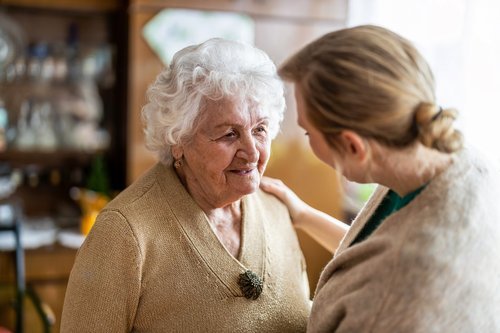INFORMATION TO SHARE WITH YOUR KIDS ABOUT DEMENTIA.
BANNISTER IN HOME CARE
FOR PARENTS AND GRANDPARENTS
Dementia can significantly impact young people when a loved one is diagnosed. This guide provides insights into how children and adolescents may react and offers strategies for parents and grandparents to support them.
While dementia primarily affects the elderly, younger family members can also be deeply affected. It might be a grandparent or, in cases of early-onset dementia, a parent. Young people, already navigating their own developmental challenges, must also cope with a loved one's illness.
Communicating with Children
It's crucial to talk openly with children and grandchildren about dementia and listen to their concerns. Providing simple, age-appropriate information can help them understand the situation without feeling overwhelmed.
Talking to Adolescents
Adolescents might be more articulate about their feelings but may not always initiate conversations. Look for behavioral cues that indicate they need to talk and encourage open discussions. They may feel more comfortable speaking with peers or a counselor.
Young People's Reactions
Children and teenagers will respond differently based on their age, personality, and relationship with the person with dementia. Common questions include:
What’s happening to the person with dementia?
Why is it happening?
Can medicine cure it?
Did I cause this?
Will I get it too?
Will they die?
How can I help?
Who will take care of me?
Why are people sad and angry?
Why can’t things be the same as before?
Emotions Young People May Feel
Young people may experience a range of emotions such as:
Fear
Guilt
Denial
Jealousy
Resentment
Frustration
Anger
Sadness
Stress
Embarrassment
A sense of responsibility or reluctance to accept it
Despair and hopelessness
Helplessness
Strategies to Support Young People
Reassure them they are loved and supported.
Acknowledge the challenges they face.
Encourage them to express their feelings openly.
Help them confront and manage their fears.
Maintain family routines to provide a sense of security.
Spend quality time with them individually.
Make and follow through with family plans.
Utilise respite services to give everyone a break.
Encourage teenagers to pursue their interests and make plans.
Address conflicts and problems directly.
Schedule family discussions about responsibilities without making "helping" the sole focus.
Inform teachers or school counselors about the family situation and monitor for any issues at school.
Promote learning about dementia within the school environment.
Caregivers should also take care of their own well-being and assure children that they are healthy.


